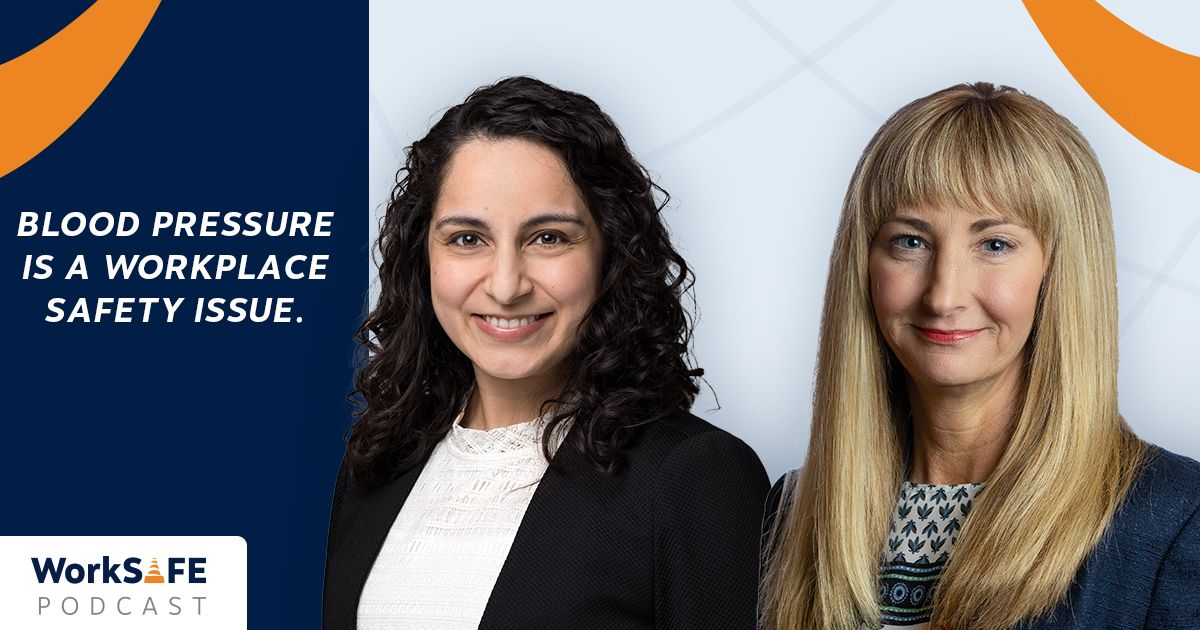For Media Inquiries
Contact Revee White, Director of Marketing and Communications at rwhite1@mem-ins.com or 573.499.4190.
High blood pressure is an increasingly important public health issue. It’s estimated that 1.28 billion adults aged 30 to 79 have it. Nearly 46% of them are unaware that they have this condition. High blood pressure and cardiovascular disease go hand in hand. And those risks don’t stop at work.
Heart health matters in the workplace. The American Heart Association reports that heart disease results in 13 lost work days per year on average. Strokes cause nearly 20 lost work days. High blood pressure often goes unidentified and unmanaged. However, preventative action and disease management saves lives.
On this episode of the WorkSAFE Podcast, we are joined by Dr. Sudhi Tyagi. She is an interventional cardiologist and board-certified in internal medicine, cardiovascular disease, echocardiography and nuclear medicine. Her mission is to align her patients’ values with their treatment strategy to produce the best possible medical outcomes.
First, we’ll explain the basics of blood pressure. Then, we’ll share how employers can prioritize heart health. Finally, we’ll discuss the importance of looking out for others in the workplace.
Listen to this episode of the WorkSAFE Podcast or read the show notes below.
Blood pressure begins in the heart
“When the heart’s pumping, it pumps blood out into the arteries of the body,” Dr. Tyagi explained. “It’s this force of the blood that’s being pumped by the heart into the arteries that helps define what blood pressure is.”
Blood pressure measurements are made up of two elements: systolic and diastolic. Systolic blood pressure is the force on the walls of the arteries when the heart is actively beating and pumping. This number tends to be higher. Diastolic blood pressure is the force exerted when the heart is relaxed between pumps. This number tends to be lower.
For example, relatively normal blood pressure is currently considered 120 over 80. However, medication and research trials reveal new information about the healthiest and unhealthiest numbers. As a result, the baseline healthy blood pressure number changes over time.
High blood pressure leads to heart damage
“When blood pressure is too high, this can lead to damage to those arterial walls that are being bombarded with blood,” she shared. “Injury to these delicate arterial walls can have a significant impact on our health.” This condition sometimes leads to heart and blood vessel diseases, strokes, and issues with other organs.
Regular checks are vital to staying on top of potential risks. Dr. Tyagi recommends that people check their blood pressure at least once yearly. Most medical providers check blood pressure during medical appointments. Blood pressure cuffs are also for sale at many pharmacies.
Stressful situations affect these numbers. For instance, some people are nervous during a clinical visit. Dr. Tyagi typically starts treatment for high blood pressure when high numbers have been shown two to three times.
Putting heart health first in the workplace
High blood pressure is a concern for employees in construction, manufacturing and utilities. For Dr. Tyagi, making a difference in these high-stress industries starts in the workplace. “ I think it‘s so important to promote this culture of wellness and health in the day-to-day environment,” Dr. Tyagi said. This means:
- Having conversations about heart health. Educate employees on ways to maintain a heart-healthy lifestyle. For example, creating a smoke-free workplace reduces health risks for all employees.
- Scheduling blood pressure screening events. Some employees avoid or put off seeing their healthcare providers. A workplace event empowers employees to know their numbers.
- Investing in resources. An AED, or even cards that show the basics of chest compressions, can mean the difference between life and death.
- Taking a proactive approach to general wellness and cardiovascular health. Encourage employees to see their doctors at least once a year. If employees can eat in an on-site cafeteria, offer healthy options.
Looking out for one another on the job
“We’re the best advocates for our colleagues around us and for ourselves,” Dr. Tyagi explained. “If you see something or somebody doesn’t look right, ask them how they’re doing,” she advises. Look out for coworkers. Check in on those who work alone or in off-site locations.
Early response is the most important element in the event of a heart attack, stroke, or other health issues. Check for breathing and a pulse if they lose consciousness. Start chest compressions, or use an automatic external defibrillator (AED) immediately if they don’t have a pulse. Asymmetry of the face, slurred speech, and inability to move an arm or a leg are telltale signs of a stroke.
The time it takes to get to medical care is essential in these situations. Have someone call 911 as soon as possible. “Don’t hesitate; just call and get help when you need it,” Dr. Tyagi encourages. “If it ends up not truly being an emergency, that’s okay, but that’s what we’re here for, to help out in those situations.” Quick action is key to good long-term neurological outcomes.
Make time for what matters
Dr. Tyagi highlights that time is one of the most significant barriers for employers and employees alike. “It is just so difficult to find time to set aside for something that doesn’t look like it’s critically important,” she shared. High blood pressure is known as ‘The Silent Killer.’ There often aren’t any symptoms. Further, once people start to feel them, it significantly impacts their health.
Starting conversations about heart health is one way employers can jumpstart an employee’s wellness journey. But at the end of the day, it’s essential to prioritize personal wellness. “You are your best advocate,” Dr. Tyagi emphasized. “There is nobody watching out for you better than you can yourself. So take just a few small steps every day to getting healthy.”


